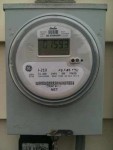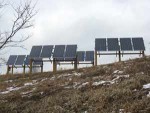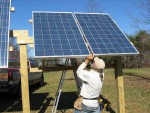- Share on Facebook
- Like
- Tweet
- Digg
- Del
- Tumblr
- VKontakte
- Buffer
- Love This
- Odnoklassniki
- Meneame
- Blogger
- Amazon
- Yahoo Mail
- Gmail
- AOL
- Newsvine
- HackerNews
- Evernote
- MySpace
- Mail.ru
- Viadeo
- Line
- Comments
- Yummly
- SMS
- Viber
- Telegram
- Subscribe
- Skype
- Facebook Messenger
- Kakao
- LiveJournal
- Yammer
- Edgar
- Fintel
- Mix
- Instapaper
- Copy Link
As lawmakers move to dismantle West Virginia’s six-year-old alternative-energy law, they tout their action as another effort to help the state’s declining coal industry.
However, state records show that the 2009 law actually does little to hurt the coal industry and maybe even less to really promote alternatives like wind energy or solar power. West Virginia’s coal-heavy utilities say they have been — and will continue to be — able to meet the law without adding new renewable generation.
Experts say the whole debate, pushed by the Legislature’s new Republican leadership, highlights the lack of any real discussion among most West Virginia elected officials about doing more to diversify the state’s energy portfolio and, with it, the state’s economy.
“They are going the opposite direction of where they need to go,” said Jeremy Richardson, a West Virginia native who is a senior energy analyst with the Union of Concerned Scientists. “It’s just political theater.”
Echoing political campaigns by some high-profile Republicans in the state, lawmakers and some in the state’s news media have called the legislation, passed when Sen. Joe Manchin, D-W.Va., was governor, a “cap-and-trade bill.”
A Senate bill to repeal the 2009 law passed unanimously Wednesday. The House version is up for passage on Thursday.
Earlier this week, James Van Nostrand, a West Virginia University law professor and director of the WVU College of Law’s Center for Energy and Sustainable Development, tried to clear up some misunderstandings about the issue during an appearance before the House Judiciary Committee.
Van Nostrand told lawmakers the state’s “Alternative and Renewable Portfolio Standard” doesn’t actually require utilities in West Virginia to switch to renewable energy, hasn’t hurt the coal industry and hasn’t forced higher rates onto electricity customers.
The concept of cap-and-trade refers to setting a limit on emissions, and then allowing companies to trade emission reduction “credits” in a market-based method of curbing pollution. Energy portfolio standards are different from cap-and-trade laws. They require utilities to get a certain share of their energy generation portfolio from different sources. The term is used most widely to describe programs that set a minimum requirement for generation from renewable sources, such as wind and solar, that will help reduce greenhouse emissions.
West Virginia’s standard sets a phased-in approach for utilities to provide a share of the electricity they sell in the state from alternative sources: 10 percent by 2015; 15 percent by 2020; and 25 percent by 2025. However, as Van Nostrand told lawmakers Monday, the West Virginia law defines “alternative” energy to include natural gas generation and certain types of “advanced coal” power plants.
The standard, as written, “does virtually nothing to stimulate development of renewable resources within West Virginia,” Van Nostrand wrote in a 2014 law review article. West Virginia’s energy portfolio standard is the only one in the country in which there is no maximum amount of nonrenewable energy that can be counted as “alternative,” according to a 2012 Department of Energy analysis.
This definition allows West Virginia’s two largest utilities — the state operations of American Electric Power and FirstEnergy — to meet the required share of alternative generation using their current coal-focused mix, according to annual reports the companies have filed with the state’s Public Service Commission.
“I can’t say we’re doing anything differently,” said Mark Dempsey, a vice president at AEP’s Appalachian Power unit. “The things that ended up qualifying as ‘alternative’ ended up being pretty expansive.
“We have had inquiries, more than one, over the course of the last few months, wanting us, I guess, to say negative things about this,” Dempsey added. “But our answer has been, we know we’re meeting the 2015 requirements, and we believe we would meet 2020 and 2025 requirements with no additional cost to our customers.”
Van Nostrand has argued that West Virginia electricity customers have “not been well served” by the state’s heavy reliance on coal, and some citizen groups have made the same arguments before the PSC over the transfer of ownership of three coal-fired power plants from out-of-state FirstEnergy and AEP parent companies to their in-state utility subsidiaries.
The PSC has disagreed, though, in one case involving FirstEnergy’s Harrison Power Station . Then-commissioner Ryan Palmer wrote in a dissenting opinion that it was dangerous for West Virginia to be going “all in” on coal at a time when “the general school of thought is to diversify” energy generation.
One small step forward in improving West Virginia’s energy system might have come last year, when lawmakers approved a bill to require utilities to begin what’s called “integrated resource planning.”
That bill, generally supported by utilities, would require energy companies to examine their peak electricity demands, and consider various options — including generation and better efficiency — for meeting that demand.
Van Nostrand points out that while the bill requires utilities to file such plans with the PSC, and mandates that the PSC “analyze and review” those plans, it doesn’t specifically require PSC approval of the plans.
Still, the group Energy Efficient West Virginia calls passage of the bill “a win for advancing energy efficiency in the Mountain State.”
Emmett Pepper, executive director of EEWV, noted that the PSC has yet to issue an order that would outline how it plans to implement the integrated resource planning bill. Lawmakers gave the commission until March 31 of this year to issue that order.
“It really is up to the PSC at this stage,” Pepper said. “We’re kind of in a waiting pattern.”
Reach Ken Ward Jr. at kward@wvgazette.com, 304-348-1702 or follow @kenwardjr on Twitter.
(This article was printed in the Charleston Gazette on January 15, reprinted here with permission.)
http://www.wvgazette.com/article/20150121/GZ01/150129822/1419







